| Site Map | Contacts | Links | Newsletter | |
The Bible and Science:
Does God Exist?
Breaking News
FAMED ATHEIST PHILOSOPHER, ANTONY FLEW, NOW BELIEVES IN GOD
In my college class in philosophy, Antony Flew was required reading. His
writings tempted me to doubt the very existence of God. So I was shocked
to learn that he now believes in God. Interview with him at Atheist
Becomes Theist. See also Sorry,
says atheist-in-chief, I do believe in God after all and Famous
Atheist Now Believes in God.
Arguments for God
- The Design or Teleological Argument.
We see much design in the world. Something designed points to a designer. The universe is very fined tuned for life. This could not be by accident but design. This is the number one reason why people say they believe in God.
British physicist Paul Davies writes in his book Superforce, "The laws [of physics] ...seem themselves to be the product of exceedingly ingenious design...The universe must have a purpose." In his book The Cosmic Blueprint he states, "[I see] powerful evidence that there is something going on behind it all. The impression of design is overwhelming."
Hugh Ross has some excellent books pointing out how fine tuned the universe is for life. His web site is Reasons to Believe.
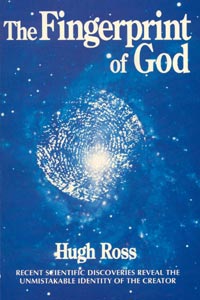
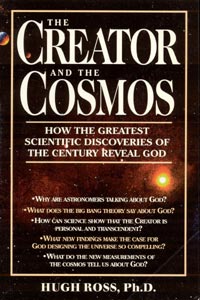
The Fingerprint of God by Hugh Ross published by Promise, 1989. The Creator and the Cosmos by Hugh Ross published by Navpress, 1993.
- Primer Mover Argument
The world is in motion. Someone must have started the motion. This is similar to the next argument.
- First Cause Argument
The world has cause and effect sequences. There must be an efficient first cause for everything in the world.
Since the discovery of the expansion of the universe, Scientists realize the universe had a beginning. How did the beginning begin? Some astronomers turned to God. Astronomer Robert Jastrow states, "The scientist has scaled the mountains of ignorance; he is about to conquer the highest peak, as he pulls himself over the final rock, he is greeted by a band of theologians who have been sitting there for centuries."
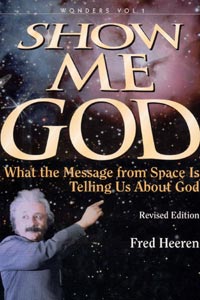
A good book on this is Show Me God by Fred Heeren (Day Star, 1997). Website: Day Star
-
The Perfection or Ontological argument. If there is something good and true, there must be something truest or perfect from which everything comes which must be God.
-
The Moral argument. Humans know right from wrong. Animals do not. Where does this morality come from, God.
-
The miracles argument. Miracles show there must be a God.
-
The experience argument. I have experienced God's power, he must exist. Similar to this is the next one.
-
The consoling argument. I believe because it makes me feel better.
Pascel's Wager Argument
If we bet there is no God, and there is we lose everything. If we bet there is a God, and there is a God we have everything to gain. Even if there is no God, we lose nothing. Better saved then sorry.
Paley's Watchmaker Argument
If someone walking through the woods finds a watch, he does not say it evolved by chance. One sees it has design therefore there must be a designer. Has anyone seen this designer? No! Yet we know there is a designer. So too, we do not see God, yet we do see the wonderful design of his creation.
See Is There Scientific Evidence for the Existence of God? How the Recent Discoveries Support a Designed Universe by Dr. Bradley.
The God-part of the Brain
What I find interesting is the research done on the brain that shows there may be a God-part of the brain in the temporal lobe. Michael Persinger stimulates the temporal lobes with a magnetic field to produce spiritual experiences. He can seemingly change an atheist into a theist. Vilayanur Ramachandran has also done research. See This Is Your Brain on God.
Vilayanur Ramachandran
In October 1997 Vilayanur Ramachandran, a neuroscientist delivered a paper entitled "The Neural Basis of Religious Experience." He presented evidence how the brain processes spiritual experience. He noticed that people with Temporal Lobe Epilepsy (TLP), have stronger religious feelings. This may indicate that the temporal lobe is where religious experiences occur.
Michael Persinger
At Laurentian University in Sudbury, Canada Michael Persinger has a lab set up to induce religious experiences. A person puts on a motorcycle helmet equipped with electromagnets that product a magnetic field that causes micro seizures (overactive neutrons) in the temporal lobe of the brain. These micro seizures cause spiritual and supernatural experiences. People will feel a sense of presence in the room (like God, angels or aliens), or have an out-of-body experience (like a near-death experience).
According to Persinger the sense of self is in the left hemisphere of the temporal cortex matched by a corresponding sense of self in the right hemisphere of the temporal cortex. When these two hemispheres become disorientated there will be a sense of another self. When the amygdala is also stimulated, emotional feelings will be enhanced causing intense spiritual feelings.
A number of events can trigger these spiritual or supernatural experiences.
- Very Stressful events-like a car accident, or surgery.
- Decrease in oxygen to the brain- like at very high altitudes. A centrifuge can cause out-of-body experiences.
- Extreme changes in blood sugar levels.
- Fasting
- Many hours of Sleeplessness.
- Temporal lobe seizures
- Electromagnetic disturbances in the earth
- Drugs
- Trances from repetitive acts like chanting or dancing, meditation.
More information about the God-part of our brains.
Atheists
Most Atheists come from a family where the father was missing, dead, weak or abusive. Paul C. Vitz has written a very interesting book entitled Faith of the Fatherless: The Psychology of Atheism (Spence, 1999).

How one views God is directly related to how your relationship with your father was. If your father was distant than God will feel distant. If you hated your father, you will most likely have hatred for God. This is the case with Madalyn Murray O'Hair and many other Atheists.
Madalyn Murray O'Hair
According to her son William, Madalyn had an intense hatred for her father so much so that she tried to kill him. Madalyn was probably abused psychologically and physically in her childhood. William Murray writes about this in his first chapter of his book entitled My Life Without God.
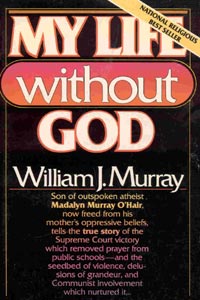 |
My Life Without God by William J. Murray published by Thomas Nelson, 1982. |
How We Believe?
Michael Shermer has written a very interesting book entitled How we Believe: The Search for God in an Age of Science published by Freeman, 2000.
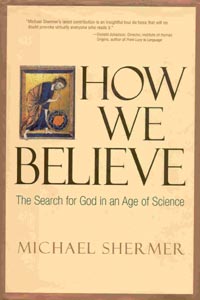 |
How we Believe: The Search for God in an Age of Science by Michael Shermer, published by Freeman, 2000. |
He states that we can not prove there is a God, or there is not a God. It is a matter of belief or faith.
The Putneys tell how an atheist and a Christian spent hours debating whether God existed. The Christian was raised in an agnostic home. He was trying to dispel his unconscious doubts about his faith by vehemently arguing with the atheist. The atheist was raised in a religious home and argued just as vehemently to dispel unconscious doubts about his atheism. It would be far better to deal with our doubts at a conscious level, then defensively pushing others way (Putney, S. and G. Putney. 1964. The Adjusted American. Harper and Row, pp.49-51).
Links
- I Lost It - Noted missiologist Ruth Tucker shines a light on the netherworld of apostasy in Walking Away from Faith.
